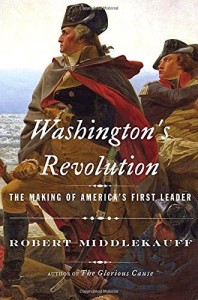Robert Middlekauff has a new book coming out on February 3, 2015 entitled “Washington’s Revolution: The Making of America’s First Leader.” Middlekauff is Professor Emeritus at the University of California Berkeley.
Why another book about Washington? Here’s what the author says about his new book:
“There are many books about Washington and the Revolution. This one covers much familiar ground, but it also takes a cut at Washington and the Revolution in a way that is not familiar to most historians and lay or non-specialist readers. The argument is that Washington grew intellectually and morally as the Revolution developed. The nature of much of that growth revolved around Washington’s conception of what was at stake in the war with Britain: freedom and the union of American states, and the importance of the struggle for liberty in America to the larger world.”
Synopsis of the book: From Random House, here’s a synopsis of the book: A vivid, insightful, essential new account of the formative years that shaped a callow George Washington into an extraordinary leader, from the Bancroft Prize winner and Pulitzer Prize finalist Robert Middlekauff.
George Washington was famously unknowable, a man of deep passions hidden behind a facade of rigid self-control. Yet before he was a great general and president, Washington was a young man prone to peevishness and a volcanic temper.  His greatness as a leader evolved over time, the product of experience and maturity but also a willed effort to restrain his wilder impulses.
His greatness as a leader evolved over time, the product of experience and maturity but also a willed effort to restrain his wilder impulses.
Focusing on Washington’s early years, Robert Middlekauff penetrates his mystique, revealing his all-too-human fears, values, and passions. Rich in psychological detail regarding Washington’s temperament, idiosyncrasies, and experiences, this book shows a self-conscious Washington who grew in confidence and experience as a young soldier, businessman, and Virginia gentleman, and who was transformed into a patriot by the revolutionary ferment of the 1760s and ’70s. Taking command of an army in constant dire need—of adequate food, weapons, and, at times, even clothing and shoes—Washington displayed incredible persistence and resourcefulness, growing into a leader who both understood and defined the crucial role of the army in the formation of a new American society.
Middlekauff makes clear that Washington was at the heart of not just the revolution’s course and outcome but also the success of the nation it produced. This is an indispensable book for truly understanding one of America’s great figures.

 Facebook
Facebook
 Twitter
Twitter
 LinkedIn
LinkedIn
 YouTube
YouTube
 Pinterest
Pinterest